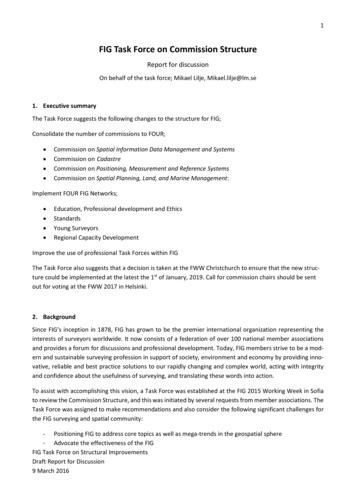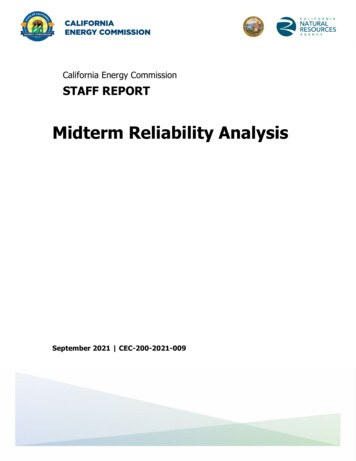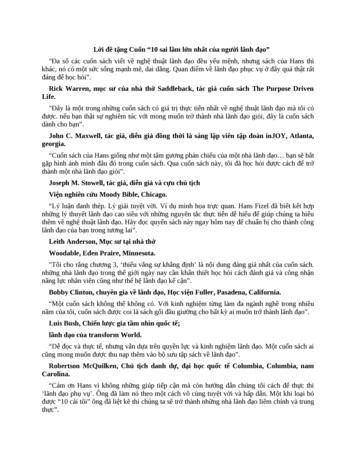
Transcription
[Type text]REPORT FROM THE SPECIALCOMMISSION TOINVESTIGATE THEEXPANSION ANDENHANCEMENT OF THEMASSACHUSETTSBEHAVIORAL HEALTHACCESS WEBSITE INACCORDANCE WITHCHAPTER 258 SECTION 44 OFTHE ACTS OF 2014December2014
TABLE OF CONTENTSTable of Contents1.EXECUTIVE SUMMARY . 22.BACKGROUND . 63.MEETING SUMMARIES . 74.DISCUSSION OF THE MANDATES AND RECOMMENDATIONS . 105.OTHER CONSIDERATIONS. 156.CONCLUSION . 177.ADDENDUM . 181
1. EXECUTIVE SUMMARYOverviewThe Special Commission (Commission) to investigate the expansion and enhancement of theMassachusetts Behavioral Health Partnership’s (MBHP) Massachusetts Behavioral HealthAccess (MABHA) website was established by Chapter 258 Section 44 of the Acts of 2014. TheCommission’s mandate was to “make recommendations on ways to improve provider, carrierand public search capabilities to locate inpatient beds, services and placement for individualswith mental health and substance abuse needs in real-time for the purpose of referringindividuals in need of services.” Specifically, the Commission was charged with the followingtasks: Develop a list of additional services and facilities to include as part of the website;Develop requirements for submission of information on service availability andpublication of the information on the website in real-time, including requirements forfrequency of data submission and reporting;Develop requirements for additional information to be posted on the website, includingany admission requirements or restrictions;Develop recommendations that the Department of Mental Health, the Department ofPublic Health and other appropriate state agencies may adopt under existing regulatoryauthority to create and enhance access for said placement services; andDevelop recommendations as to whether the website should be a state run and operatedfunction.Pursuant to its authorizing statute, the Commission was comprised of nine (9) members, asfollows: The Commissioner of Mental Health, or designee (chair)The Commissioner of Public Health, or designeeThe Director of the Office of Medicaid, or designeeOne Representative from each of the following six organizationso The Massachusetts Behavioral Health Partnershipo The Massachusetts Association of Health Planso The Massachusetts Hospital Associationo The Massachusetts Medical Societyo The Massachusetts Association of Behavioral Health Systemso The Massachusetts College of Emergency PhysiciansA list of Commission members follows in the report.2
Beginning in October, 2014, the Commission held five (5) meetings. During the first and secondmeetings, the Commission received presentations from the MBHP on the MABHA website,which is the existing “bed-finding” tool, and from the Department of Public Health (DPH),Bureau of Substance Abuse Services (BSAS) on the substance abuse treatment services offeredby the state. In addition, the Commission received and reviewed data supplied by theDepartment of Mental Health (DMH) on current and planned capacity of inpatient psychiatricfacilities licensed by that agency.The third and fourth meetings were devoted to consideration of the Commission’s mandatedtasks, including comments and recommendations proposed by each member. A draft of theCommission’s report and recommendations were also considered at the fourth meeting and werefinalized at the fifth and final meeting on December 17, 2014.Summary of Commission Recommendations:1. With respect to additional services and facilities to include as part of the website, theCommission recommends the following information be added:A. Clinical Stabilization Services (CSS) funded by DPH should be added to the MABHAwebsite with all the profile information contractually required of CSS providers to updatebed availability.B. A link to the current BSAS service locator and its new Central Navigation System(CNS) (when operational) should be included on the MABHA website so that the usercan go directly to the BSAS system to get information about applicable services.2. Regarding requirements for submission of information on service availability andpublication of the information on the website in real-time, including requirementsfor frequency of data submission and reporting:A. The Commission chose not to make any recommendations for required submissionsof information on service availability and publication of the information on thewebsite beyond what exists, despite robust conversation detailed later in the report.3. Regarding requirements for additional information to be posted on the website,including any admission requirements or restrictions:A. The Commission recommends that the MABHA website provide 24x7/365 contactinformation for all payers. This information would enable plans and providers towork together to enhance communication and to ensure that the necessary bed findingassistance is available when needed.B. Enhanced search capability should be available to provide the user with a more robustsearch function that allows information about waiting members, such as gender, age,3
single room requirements, payer, level of care, need for general hospital vs.psychiatric hospital only services, etc., to enable a match with available beds.C. Complementary to this enhanced search capability, the Commission recommendsenhancing the website tool to specifically allow Emergency Departments (EDs) tovoluntarily post relevant information, to be determined, about members waiting for apsychiatric or substance use bed.D. User guide instructions for inpatient providers should include guidance for inpatientfacilities to voluntarily enter anticipated discharges for a particular day.E. Additional information within the facility profile would be helpful on the website. Inparticular, providing additional facility details regarding available cultural, linguisticor language services would help EDs to better match a patient with the most effectivefacility to provide the needed services.F. A description on the website which further explains available levels of care and aglossary of terms which includes a list of acronyms and abbreviations should beadded.4. Concerning whether the Department of Mental Health, the Department of Public Healthand other appropriate state agencies may adopt under existing regulatory authority tocreate and enhance access for said placement services, the Commission recommends:A. Consideration of the inclusion of reporting requirement to MABHA website as partof related DMH licensing regulations, BSAS regulations and/or BSAS or other statecontracting. This inclusion will help to reinforce adherence to requirements andtimely, up-to-date reporting. The consideration of reporting incentives over anyregulatory approach should also be considered. However, consensus was not reachedon the issue of amending regulations.5. With respect to whether the website should be a state run and operated function, theCommission recommends the following:A. The MABHA website should remain owned and managed by MBHP at this time.The rationale behind this Commission conclusion is that MBHP already has theexperience and technical expertise to continue to maintain the website. Also, theMBHP provider network and other providers are currently able to access this system.In addition, MBHP has managed this process effectively and therefore, is well suitedto continue to run and operate this function.4
The designated members from each agency are listed below:Last NameTitleFirst NameCHAIRShea-DelaneyEllieCommission ParticipantsOrganizationAddressDept. of Mental HealthAssistant Commissioner, Central Office Program Development & Clinical & Professinal25 Staniford St., Boston, MAInteragency Planning SvcsTel. #617-626-8253E-Mail ice President, of Legal Mass. Association ofSarah Gordon AffairsHealth Plans40 Court St., Suite 550, Boston, Ma.617-338-2244 ext 103 r100 Hancock St,, Quincy, MA 02170 617-847-1257GranoffKarenSenior Director,Managed Care PolicyHauser, atteodoDavidMercier, Esq., MPHRachelle S.Muir, LMHCMoiraUltimo-Prophil, MSWLydieWallaceCONSULTANTSRonna5 New England Executive Park,781-262-6035Burlington, Ma 01803860 Winter St., Waltham Woods Corp.Consulting Psychiatrist Mass. Medical Society Ctr., Waltham Ma 02451617-969-6331Chief of EmergencyMass. College ofMedicineEmergency Physicians 14 Prospect St., Milford, MA 01748 508-422-2250Mass. Assoc. of115 Mill St., MS102, Belmont, MaBehavioral HealthExecutive Director617-855-352002478SystemsManager, Health Care Mass. Hospital5 New England Executive Park,781-262-6064Policy & AnalysisAssociationBurlington, Ma 01803Vice President, Network Mass. Behavioral1000 Washington St., Suite 310,978-716-3381Health PartnershipManagementBoston, Ma 02118250 Washington St., Boston Ma.Director, BSASDept. of Public Health 02108617-624-5151Mass. College ofLegislative LiaisonEmergency Physicians 860 Winter St., Waltham Ma 02451 617-721-5655Baer, MSShelleyDirector, ve LiaisonProject ManagerGilmanAmanda251 West Central Street, Suite 21,Senior Director of Policy Association forand ResearchBehavioral Healthcare Natick, MA 01760508.647.8385 x16agilman@abhmass.orgGreenberg, Ph.D.JoshuaSpecial Assistant to the DMH Central Office 25 Staniford St., Boston, Ma, 02114Deputy Commissioner renLead ptions.comHopkins, M.D., FACEP JeffMass. HospitalAssociationMass. BehavioralHealth PartnershipDMH Central Office CPSMassHealthMass. BehavioralHealth Partnership1000 Washington St., Suite 310,Boston, Ma 02118978-716-338325 Staniford St., Boston, Ma, 02114 617-626-8140100 Hancock St,, Quincy, MA 02170 617-847-12591000 Washington St., Suite 310,Boston, Ma te.ma.us
2. BACKGROUNDIn the Commonwealth of Massachusetts, individuals in acute psychiatric distress or substanceuse disorders often find themselves in general hospital emergency rooms undergoing evaluationsfor inpatient psychiatric hospitalization and/or substance abuse services. As in many otherstates, patients may face long waits for a suitable bed to be located. Wait times, particularly forpsychiatric care, can far exceed the wait time generally required for acute medical conditions andmay be hours and sometimes days.One tool that has been developed to help address this problem is the MABHA website.Developed by the MBHP under its contract with MassHealth, the MABHA website containsimportant information, updated daily, on the availability of acute psychiatric inpatient bedswithin MBHP’s provider network, as well as some providers outside their network.In August 2014, the Legislature established this Commission to investigate the expansion andenhancement of the MABHA website pursuant to Section 44 of Chapter 258 of the Acts of 2014.The Commission’s mandate was to “make recommendations on ways to improve provider,carrier and public search capabilities to locate inpatient beds, services and placement forindividuals with mental health and substance abuse needs in real-time for the purpose ofreferring individuals in need of services.” Specifically, the Commission was charged with thefollowing tasks: Develop a list of additional services and facilities to include as part of the website;Develop requirements for submission of information on service availability andpublication of the information on the website in real-time, including requirements forfrequency of data submission and reporting;Develop requirements for additional information to be posted on the website, includingany admission requirements or restrictions;Develop recommendations that the Department of Mental Health, the Department ofPublic Health and other appropriate state agencies may adopt under existing regulatoryauthority to create and enhance access for said placement services; andDevelop recommendations as to whether the website should be a state run and operatedfunction.Convened on October 1, 2014, the Commission had five in-person meetings at the central officeof DMH, 25 Staniford St., Boston, MA 0114. The other four meetings were held on October15th, November 5th, November 19th, and December 17th, 2014.As part of the Commission process, each member was given an opportunity prior to the thirdmeeting to submit his/her own comments and recommendations on each of the tasks assigned bythe Legislature, in order to facilitate consensus on the recommendations. Theserecommendations were the focus of the third meeting. The fourth meeting involved an in-depth6
review of the draft Commission report and recommendations. Additionally, the Commission feltit prudent to add a fifth meeting to permit the Commission another opportunity to review andcomment on the final report.The focus of the Commission, as directed by the Legislature, was on improving the MABHAwebsite, with the underlying goal of improving access to 24/7 acute psychiatric and substanceuse care. In the course of the discussion, a variety of other ideas and concerns were raised thatwere not related to the immediate task at hand and therefore, did not lead to a recommendation.However, some of these issues are noted in the report, as they impact bed availability andcontribute to larger systemic bed access problems.Copies of the agendas and relevant material will be available at the following website no laterthan January 15, 2015: -the-acts-of-2014.html3. MEETING SUMMARIESPresentation and Demonstration by Massachusetts Behavioral Health Partnership(MBHP)At the first meeting, there was a presentation of the guidelines and instructions for use of theMABHA website. Access to the website was given to each member during the SpecialCommission meeting period.The MABHA website tool went live June 30, 2009 to provide a statewide “bed-finder” tool.The website was designed with contributions from a hospital site in Minnesota that developedthe tool for similar use. Specifically, the website is designed to help providers find availablecapacity in mental health and substance use disorder facilities. It is available to emergencyservices providers, mental health and substance abuse providers, emergency department staff,health plans, and state agencies in search of 24/7 bed availability.The Emergency Services Programs (ESPs) are the primary MABHA website users. Theseprograms cover the state and provide crisis assessment, intervention, and stabilization services 24hours per day, seven days per week, 365 days per year, to MassHealth members of all ages whoare experiencing a behavioral health crisis. There are twenty-one ESP vendors, seventeenprivately operated vendors managed by MBHP and four operated by DMH. ESP services areavailable to the uninsured and Medicare population through funds from DMH and to members of7
some private health plans that choose to contract for this type of service. The purpose of the ESPis to respond rapidly, assess effectively, and deliver a course of treatment intended to promoterecovery, ensure safety, and stabilize the crisis. This service should be delivered in a manner thatallows a member to receive medically necessary services in the community, in an inpatientfacility, or 24-hour diversionary level of care, whichever is most appropriate.MBHP offered an interactive demonstration of the services that can be searched using theMABHA website, including 24-hour levels of care and Children’s Behavioral Health Initiative(CBHI) services. MBHP noted the available programs and services with 24-hour levels of careas well as CBHI services.These services are:24/7 Psychiatric inpatient servicesCommunity-Based Acute Treatment (CBAT)Intensive Community-Based Acute Treatment (ICBAT)Adult and Adolescent Addiction Treatment Services (ATS)Enhanced Acute Treatment Services (EATS)CBHI In-Home Therapy (IHT)In-Home Behavioral Services(IHBS)Intensive Care Coordination (ICC)Therapeutic Monitoring (TM)Providers on the website include not only those in the MBHP network, but those in the networkof other health plans and some out of state providers. Access is granted by request to MBHP.Furthermore, the tool is very flexible. Search results can be filtered and sorted in three ways: zipcode/proximity, most recent updates, and current available capacity.Access to the website is not restricted to MBHP providers and may be used by EDs, all healthplans and other appropriate organizations upon request. All relevant MBHP contracted providersare required to list their services on the website and are expected to update capacity at least threetimes per day for 24-hour levels of care, a minimum of once per 8 hour shift. Facility listingsinclude contact information, accepted payers and insurance, and referral options, programdescriptions and specialties. CBHI providers, which do not provide 24 hour access, updateavailable capacity a minimum of once per week. Provider compliance with updating is monitoredby MBHP. They will contact any provider not in compliance on the day it occurs.8
MBHP noted the practice of many hospitals relying only on ESPs and not hospital staff to checkthe website. Members believed it would be advantageous for hospital staff to use the MABHAwebsite routinely and that hospitals should be encouraged to do so. It was also noted in thepresentation that some hospitals partner with ESPs to perform this function for all ED behavioralhealth clients they see.Presentation of BSAS Treatment System and Current Planning ActivitiesAt the second meeting, staff from DPH’s BSAS unit provided a presentation on their services.BSAS oversees substance use treatment throughout Massachusetts. It is the single state substanceuse authority. This agency has responsibility for development of the service system, assuringquality of care, and funding a full continuum of prevention, intervention, treatment and recoverysupport services. BSAS also licenses treatment facilities and addiction counselors.Treatment services that BSAS funds include medically managed, medically monitored andclinically monitored inpatient programs, long term residential services for individuals withsupport for families, a range of outpatient and case management services, and recovery supportservices. The range of outpatient services currently include medical detoxification withmethadone and other medications and office based opioid treatment (OBOT), opioid treatmentprograms (OTP), day treatment and counseling, and first offender Driver Alcohol Education(DAE) programming. Many of these services are also covered by insurers.BSAS is developing a Central Navigation System (CNS) which is a statewide service to helpfacilitate and streamline the process for individuals, family members and/or providers seekingservices and resources that address substance use. This includes prevention, treatment, andongoing recovery support in the Commonwealth. With two components, a call center/helplineand a website, consumers will have access to up-to-date prevention, treatment and recoverysupport information. Trained Screening and Informational Specialists (SIS) will be available forevery caller or online visitor utilizing the instant chat feature. Working in tandem with thestate’s regional assessment centers and outpatient programs, the CNS will play a pivotal role inscreening, connecting, and referring consumers to the appropriate programs. This includeshelping them navigate through the substance use prevention, treatment, and recovery supportsystem and providing them with up-to-date information and available resources. The CNS willbe a significant enhancement to the currently available service locator service now accessiblethrough the Massachusetts Substance Abuse Information and Education Helpline.The third, fourth and fifth meetings were devoted to review of information gathered, discussionof Commission recommendations and finalization of the Commission’s report.9
4. Discussion of the Mandates and Recommendations4.1 Mandate: Recommendations for additional services and facilities to include as part ofthe website4.1.1 Discussion:The Commission discussed and identified the following ideas related to adding services andfacilities to the MABHA website tool. First, CSS should be added to the MABHA website.Second, the Commission discussed how it would be optimal to link the future CNS on the BSASwebsite to the MABHA website, as well as create a link to the current service locator tool.Beyond additional services and facilities, there was also significant discussion about a newfunction to help match clients waiting for available beds. This discussion is noted in later section.4.1.2 Commission Recommendations:As a result of the discussion, the Commission recommends the following information to beadded to the website.A. CSS, funded by DPH, should be added to the MABHA website with all the profileinformation contractually required of CSS providers to update bed availability.B. A link to the current BSAS service locator should be included on the MABHA websiteso that the user can be taken directly to the BSAS system for information. Additionally,once the BSAS central navigation system is fully operational, the Commissionrecommended that a link be added to the MABHA website, with access by guest log-in,to allow searches for available substance abuse treatment services.4.2 Mandate: Requirements for submission of information on service availability andpublication of the information on the website in real-time, including requirements forfrequency of data submission & reporting4.2.1 Discussion:The Commission discussed potential ways to improve the data quality which is currently updatedthree times a day. While receiving updates three times a day is an excellent start, it would beideal and more useful if the data were updated on a more real-time basis to more accuratelyreflect the current status of available beds at any point in a given day. Currently, MBHP’s10
performance reporting shows that updates made twice a day occur in the low 90% range; updatesmade three times a day occur in the mid 80% range.Additionally, the Commission discussed providing a contractual incentive approach to encouragefacility compliance with timely updates of their inpatient bed availability. For instance, MBHPcurrently offer some minimal incentives for compliance with updating. The Commission raisedthe possibility that MBHP may consider ways to further encourage higher rates of complianceand more timely updates by providers through the use of additional incentives. Such incentivesmight also be considered by other payers in the future.The Commission discussed several additional potential requirements for this mandate, includingadding a required field to describe available licensed beds vs. available capacity. Since thisinformation would not help with actual bed availability, it did not result in a recommendation.However, the members thought knowledge of this information would help improve the system asa whole.It was also noted that a current limitation of the MABHA website is that it is essentially a readonly guide, providing a snapshot of inpatient beds that may be available in a given facility at amoment in time. While it is not possible in the short term, the Commission would like to see thetool evolving to a website that allows real-time interactive access. Because of various issueswith updating the website, data integrity issues exist. In future models, the Commission urgesthat the website allow for interactive, bidirectional information sharing with real time data.In summary the Commission believes that more frequent data entry and more detailed reportingwill result in a tool that is more comprehensive and accurate, and therefore more valuable to allusers.4.2.2 Commission Recommendations:A. Despite the robust discussion of issues around this task, as noted above, theCommission chose not to make any specific recommendations for required submissionsof information on service availability and publication of the information on the website.The main reason is that some of these ideas cannot be easily implemented withoutsignificant redesign and investment in the website and would require in-depth discussionby stakeholders and are ultimately beyond the scope of this Commission.11
4.3 Mandate: Requirements for additional information to be posted on the website,including any admission requirements or restrictions4.3.1 Discussion:The Commission discussed requirements for additional information to be posted on the website,such as any admission requirements or restrictions. First, the Commission discussed the value oflisting other programs on the MABHA website, as well as additional disclosure regarding otherlevels of care available, including admission requirements and total bed availability. Second, theCommission discussed clarifying how many beds are available and how many are offline notingit may be valuable to provide contextual information about the discrepancy between total bedsand available beds.The Commission observed that the user guide should include a readily accessible phone numberwhich EDs or ESPs could contact for assistance with placement of patients who have prolongedboarding times to help facilitate an appropriate outcome for “stuck cases” and expediteadmission. These phone numbers would include all payers, as MBHP can only assist with theplacement of MBHP members.There was significant discussion about a new function to help match clients waiting for availablebeds. This would include both added data and new search capability. MBHP agreed that thisinformation could be added with the current technology and with appropriate planning andimplementation with the stakeholders: MBHP, the providers listed on the website, hospital EDsand ESPs.The Commission discussed and agreed that it would also be very beneficial for hospitals tovoluntarily provide and maintain additional profile information, such as gender and single roomavailability.In addition, the Commission discussed that the user guide should clarify that the website will bemore up-to-date after noontime, as daily discharges emerge. It was also mentioned that hospitalssometimes hire ESPs to handle their private behavioral health clients to ensure continuity ofservices.Finally, there was conversation regarding making the website more user friendly with glossaries,and enhancing provider profile data on the website. The details are below in therecommendations4.3.2 Commission Recommendations:A. The MABHA website should provide contact information to reach insurers on24x7/365 days per year basis. This information would enable plans and providers to12
work together to enhance communication and to ensure that necessary bed findingassistance is available when needed.B. Enhanced search capability should be added to provide the user with a more robustsearch function that includes information about waiting members, such as gender,age, single room requirements, payer, need for general hospital and level of care, tobe matched with available beds. This enhanced search feature is intended to facilitatedispositions for those waiting for treatment.C. Complementary to this enhanced search capability, the Commission recommendsallowing EDs to voluntarily post certain information about members waiting for apsychiatric or substance use bed. Patients of all payers would be added in a newsection of the website. This new option would allow opportunities for inpatientfacilities to identify EDs with multiple boarders and assist with placement of patientswaiting for beds. If it is decided that EDs may post information regarding individualswho are “boarding” for a 24 hour level of care, issues like the frequency of updatingthe information must be addressed in an implementation phase of the website. Inaddition, MBHP would need to evaluate the operational process for inputting this dataand determine whether EDs should report the patients waiting for an open beddirectly to MBHP to post, or whether access to hospitals should be increased topermit patient update capabilities. In the short-term, the Commission would like thisadded information to serve as an automated way for EDs to ask for help. In the longerterm, the Commission would recommend a broader tool to provide EDs with aninteractive bed registry.D. User guide instructions to inpatient providers should be added to allow inpatientfacilities to voluntarily enter and reflect their anticipated discharges for a particularday. This additional information will allow EDs greater flexibility in determiningcurrent available beds, providing clarification about total bed availability, as well asanticipated bed availability on a given day.E. Additional information within the facility profile would be helpful on the website. Inparticular, p
Boston, Ma 02118 978-716-3381 moira.muir@valueoptions.com Ultimo-Prophil, MSW Lydie Director, BSAS Dept. of Public Health 250 Washington St., Boston Ma. 02108 617-624-5151 lydie.ultimo@state.ma.us Wallace Ronna Legislative Liaison Mass. College of Emergency Physicians 860 Winter St., Waltham Ma 02451 617-721-5655 ronnawallace5@gmail.com CONSULTANTS











